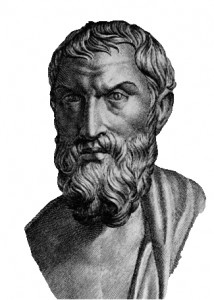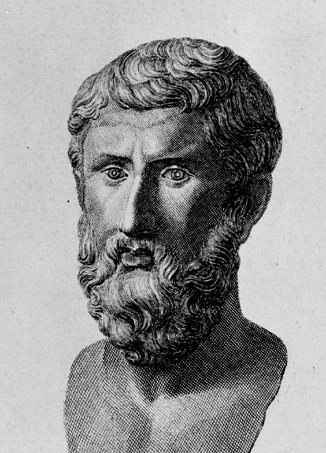Peace and Safety For Your Twentieth of October!
 Peace and Safety to the Epicureans of today, no matter where you might be!
Peace and Safety to the Epicureans of today, no matter where you might be!
For today’s post, here is a reminder of the reason we study philosophy, from a great admirer of Epicurus, Lucian, and his dialogue Hermotimus. In this selection, the speaker has pointed out to a Stoic that his search for virtue as its own reward – as the alleged goal of human life – is impossible to attain and is bound to lead to disappointment. The remedy, as Epicurus himself said many times, is to shun the false philosophical and religious models, and to seek happiness by following the guide that Nature herself has provided to living beings — putting away all false hopes of castles in the sky. Here is Lucian’s excellent statement of this argument:
[Y]ou are not alone in your disappointment; practically all who pursue philosophy do no more than disquiet themselves in vain. Who could conceivably go through all the stages I have rehearsed? You admit the impossibility yourself. As to your present mood, it is that of the man who cries and curses his luck because he cannot climb the sky, or plunge into the depths of the sea at Sicily and come up at Cyprus, or soar on wings and fly within the day from Greece to India. What is responsible for his discontent is his basing of hopes on a dream-vision or his own wild fancy, without ever asking whether his aspirations were realizable or consistent with humanity.
You too, my friend, have been having a long and marvelous dream; and now reason has stuck a pin into you and startled you out of your sleep; your eyes are only half open yet, you are reluctant to shake off a sleep which has shown you such fair visions, and so you scold. It is just the condition of the day-dreamer; he is rolling in gold, digging up treasure, sitting on his throne, or somehow at the summit of bliss; for dame How-I-Wish is a lavish facile Goddess, that will never turn a deaf ear to her votary, though he have a mind to fly, or change statures with Colossus, or strike a gold-reef.
Well, in the middle of all this, in comes his servant with some every-day question, wanting to know where he is to get bread, or what he shall say to the landlord, tired of waiting for his rent; and then he flies into a temper, as though the intrusive questioner had robbed him of all his bliss, and is ready to bite the poor fellow’s nose off.
As you love me, do not treat me like that. I see you digging up treasure, spreading your wings, nursing extravagant ideas, indulging impossible hopes; and I love you too well to leave you to the company of a life-long dream–a pleasant one, if you will, but yet a dream; I beseech you to get up and take to some every-day business, such as may direct the rest of your life’s course by common sense. Your acts and your thoughts up to now have been no more than Centaurs, Chimeras, Gorgons, or what else is figured by dreams and poets and painters, chartered libertines all, who reek not of what has been or may be. Yet the common folk believe them, bewitched by tale and picture just because they are strange and monstrous.
I fancy you hearing from some teller of tales how there is a certain lady of perfect beauty, beyond the Graces themselves or the Heavenly Aphrodite, and then, without ever an inquiry whether his tale is true, and such a person to be found on earth, falling straight in love with her, like Medea in the story enamored of a dream-Jason. And what most drew you on to love — you and the others who worship the same phantom — was, if I am not mistaken, the consistent way in which the inventor of the lady added to his picture, when once he had got your ear. That was the only thing you all looked to, with that he turned you about as he would, having got his first hold upon you, averring that he was leading you the straight way to your beloved. After the first step, you see, all was easy; none of you ever looked round when he came to the entrance, and inquired whether it was the right one, or whether he had accidentally taken the wrong; no, you all followed in your predecessors’ footsteps, like sheep after the bell-wether, whereas the right thing was to decide at the entrance whether you should go in.
__________
As Seneca recorded: Sic fac omnia tamquam spectet Epicurus! So do all things as though watching were Epicurus!
And as Philodemus wrote: “I will be faithful to Epicurus, according to whom it has been my choice to live.“

